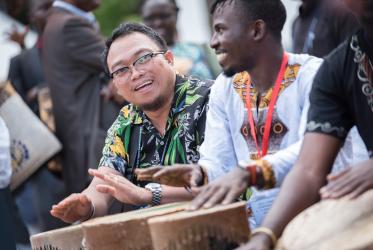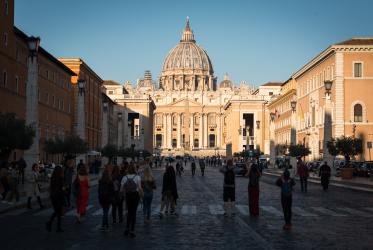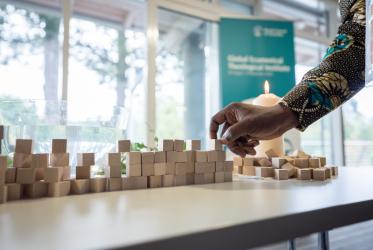by Henrike Müller (*)
Poverty is relative. But for those who suffer from it, it is absolute. "I've always thought that Germans and other west Europeans lived in paradise," says M.P.T. Basele, a pastor from Botswana. "For us it is very important to find out that there is poverty in Germany too, and what poverty means in western Europe." During a seminar at the Ecumenical Institute at Bossey, this African pastor was able to discuss "Wealth and poverty as challenge to the churches" with 11 other participants from Africa, Asia and the USA.
About eight million people in Germany live below the so-called "relative poverty line". Children and elderly people, working people and job-seekers, families and single parents are among those who live on less than half of the average net household income in the country. About 2.8 million households in Germany are over-indebted. At the same time, with a gross national income of about 515 billion euros, Germany is one of the richest nations on earth.
In other parts of the world, every day means a renewed struggle to survive. 17,000 children die of under-nourishment every day. Three billion people worldwide have less then two dollars a day on which to live. Nationally and internationally, the gap between poor and rich is widening. "But the worldwide view should in no way make the situation in Germany less important," warns Gundel Neveling, director of the Centre for Social Responsibility of the Evangelical Church in Hessen and Nassau (EKHN). "We have to keep fighting for social justice in Germany, without losing sight of the worldwide view."
Social justice means that "all people have what they need in order to live. That includes income, work, education, living space, and participation in cultural and political life," explains Ulrike Schmidt-Hesse, study director of the EKHN’s Ecumenical Centre. "A democratic state which guarantees equal rights must make sure that everyone has certain basic material needs met, since otherwise they will not be able to exercise these rights. It must be the job of the state to set limits on poverty - but on wealth as well." For democracy can only live when "the gap between poor and rich does not become too wide," she concluded.
The worsening economic situation calls for a more intensive policy debate on distribution of wealth in Germany and worldwide. Globalised economic structures simplify worldwide trade, but also require a responsible examination of their social, economic and ecological sustainability.
International seminar in Bossey
A contribution to a critical confrontation with the issue of poverty and wealth as a challenge to action by the churches was made by the recent seminar at the Ecumenical Institute Bossey in Switzerland, as a guest seminar organised by the Ecumenical Centre and the Centre for Social Responsibility, both institutions which belong to the EKHN, a member church of the Evangelical Church in Germany (EKD).
At the end of the week of shared discussions, lectures and working groups, the participants had developed creative concepts for their respective regional contexts, so that at home they could focus on the issue of social justice and the responsibility of the church as well as of every individual.
A participant from Botswana introduced a project concerned with the education of children from indigenous groups in the population who are threatened with losing access to the society’s resources because of insufficient education. A participant from Germany is planning to initiate groups of disseminators of information, to renew the discussion about fair trade and to press local retailers to sell fairly traded products. A series of lectures on the ethical use of money is being proposed by a participant from the USA.
"The churches have been quiet too long"
Besides emphasizing that the seminar had widened his horizons, M.P.T. Basele stressed the responsibility of German churches for efforts towards worldwide social justice. "If the churches in our country try to talk to the government, nobody listens to us. I am very grateful that the attempt is being made in Germany to point out, to society and government, the social injustice in many parts of the world." This discussion should not be nipped in the bud: "The churches have been quiet too long, and I am glad the debate has been opened."
Important instruments in this debate are international church organisations such as the World Council of Churches (WCC). Through their ties across geographical and confessional boundaries, they have the possibility of pursuing their goals worldwide, supporting churches and groups who are involved, and to hold conversations with other international organisations. One of the goals of the WCC programme on "Peace, Justice, Creation" is to look for alternatives to the present economic model and to create just relations between countries and people.
There are many and diverse ways towards achieving this goal. For example, the WCC participates in the work of APRODEV, an alliance of European Protestant, Anglican and Orthodox aid agencies concerned with poverty and wealth. It has also given financial support and advice to Latin American churches in developing consciousness-raising materials on economics, debt and trade. Other economic awareness-raising materials developed by the WCC are made available to churches. In February 2003 the WCC began conversations with the International Monetary Fund and the World Bank. The goal of these meetings was to have a critical discussion on the goals of, and instruments for, development.
It’s time something was done
The Bossey seminar is part of a project of the EKHN being run by its Centre for Social Responsibility and Ecumenical Centre along with the local Social Welfare Agency (Diakonisches Werk). The project is contributing to keeping up the questioning about responsible treatment of poverty and wealth in both national and global contexts, and to continually bringing the issue back into policy discussions in church and society. In view of the increases in wealth, while poverty too continues to grow, the project’s initiators are especially asking about society’s responsibility for wealth.
A study entitled "Wealth and poverty as a challenge for action by the churches" takes up impulses from the APRODEV study project on "Christianity, Wealth and Poverty in the 21st Century", and refers also to the 1997 joint statement by the EKD and the German (Roman Catholic) Bishops’ Conference, "For a Future in Solidarity and Justice".
This study and the presentations in connection with it seem to meet with widespread interest because they pick up what has by now become a burning question. "These issues are on the agenda of current political discussions; people are talking about cuts in social welfare measures, and savings are being made in places where people really should have support," says Gundel Neveling. "It’s high time something was done about it."
Besides a good basic documentation, the study provides theological statements which locate the topic in the biblical context. The equality of all people before God, and Jesus’ particular concern for the poor and marginalised, provide the theological basis for the study. While we bear in mind that wealth is not condemned in principle in the Bible, it is nevertheless criticised when it becomes an idol, being desired for its own sake and not being used for the good of others. "It’s a question of Christian responsibility," says Ulrike Schmidt-Hesse, "for the churches to do all they can to help all people have ‘Life in all its fullness’, as the Bible says."
What should be the criteria on which society is built?
What possibilities does the church have to draw attention to its position in public discussion? "To open up spaces for discussion, to express our positions and to raise public consciousness" are the decisive tasks according to Schmidt-Hesse. "We are talking about the future viability of our society." The church is expected to contribute to a discussion of the basic values for society. What should be the criteria on which the society is built? How can solidarity be promoted and inequality kept within limits?
A panel discussion with representatives of politics and economics on the effects of globalisation and the possibilities for controlling it; a workshop on issues of tax policy; a theological workshop on the question of how much wealth and how much poverty our society can stand; these are three examples of presentations in the series.
Since the study was published, two issues have become particularly explosive for Germany. On the one hand, the growing gap between private wealth and public poverty is becoming more visible. "Further tax cuts will not help us get out of the economic and social crisis", says Ulrike Schmidt-Hesse. "They only increase public poverty. Instead, higher taxes must be levied on the capital factor and on fortunes."
On the other hand, it has become clear that economic structures in Germany and worldwide are comparable. The attempt to establish the neoliberal paradigm can be observed everywhere. Thus the initiatives should not be limited to Germany. "We have to try to carry out joint analyses and develop strategies together," according to Schmidt-Hesse.
Ecumenical cooperation, which is very important to the organisers, opens up a variety of means of access. Social welfare groups as well as those who consider political involvement more important, initiatives targeted at Germany as well as internationally-oriented ones, begin conversations together and cooperate as a sort of "justice-ecumenical community", bringing together different Christian traditions to work towards a common goal: to raise consciousness of social injustice nationally and globally, to develop possibilities for political action and to improve living conditions at the concrete level.
Henrike Müller, a curate in the Evangelical Lutheran Church of Hanover, is working in the Media Relations Office of the WCC in Geneva.
Further information on the Internet:
Information on the WCC programme working on economic and globalisation issues, in the programme area Peace, Justice, Creation, may be found at
www.wcc-coe.org/wcc/what/jpc/economy.html
The Ecumenical Centre of the Evangelical Church of Hessen and Nassau Website
Information about APRODEV (Association of World Council of Churches related Development Organisations in Europe) is available at
www.aprodev.net/main/index.htm
Ecumenical Institute of Bossey





